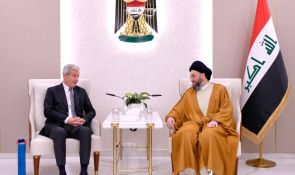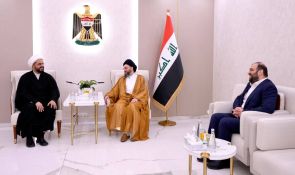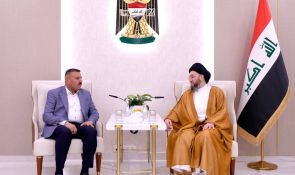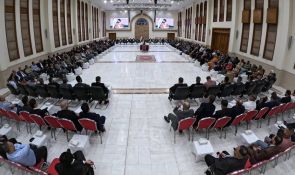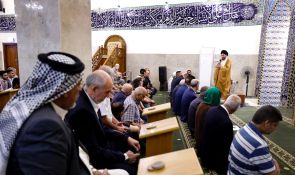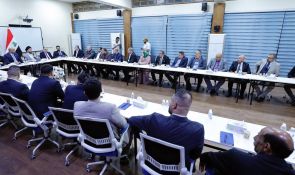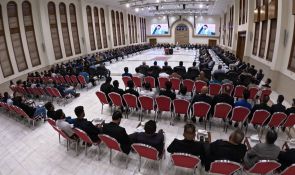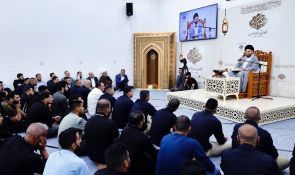Calling for Dialogue and Political Remedies, Sayyid Ammar al-Hakim Warns against the Serious Complications of the Military Intervention in Yemen
Sayyid Ammar al-Hakim, head of the Islamic Supreme Council of Iraq, warned against the serious complications of the military intervention in Yemen, calling for dialogue and political remedies, asking where is the sense of wisdom in dealing with the region’s issues. He also considered the military intervention in Yemen as a coalition involving ten states as a clear expression of the double standards, reminding that Iraq is blamed for having asked the military advice from other states when ISIS was around while a brother Arab people has been under air strikes under the pretext of ensuring the national security of some countries, stating that the problem in Yemen is political and no party can intervene at the expense of the other.
This came during the Diwan Baghdad held on Saturday, 28/3/2015 at his Eminence’s office in Baghdad in the presence of Iraqi skills, syndical figures, social society activists, artists and businessmen.
His Eminence pointed to the Iraqi situation and the victories achieved by the security forces, the popular crowd and the Iraqi tribes in “Labbaika Rasulalah” battle over an area of only 7,500 km2, explaining that the liberation of the land must be achieved with minimal losses and by avoiding Tikrit’s infrastructures, not as the Americans did in 2004 in Fallujah which was completely torn down, and the Iraqi government had to reconstruct it and build a new Fallujah. Here he maintained that Tikrit belongs to its citizens and the popular crowd has no other goal but to liberate the land and bring the displaced people back, expressing his surprise about the campaign waged against the popular crowd based on individual mistakes that any army in the world can commit.
Moreover, his Eminence said his visit to Jordan came to reveal the reality of things in Iraq and the role played by the popular crowd in restituting the liberated regions and the danger of ISIS to Iraq and Jordan, adding that his Highness King Abdullah II showed an understanding of the Iraqi situation, cooperation and conviction that ISIS is a real threat to Jordan as it is to Iraq, explaining that the visits to the neighboring countries were aimed at preventing the neighboring and other countries from developing analyses about Iraq as well as the sick analyses some sick people convey about the situation of Iraq. In the same context, he said the positive outlook of the others are an advantage to the developments taking place in it unlike how Iraqis look at their reality, stressing the importance of optimism and of not allowing the depression to take over the Iraqis for, according to him, those need to trust each other and to vote for the projects and the electoral platforms and not to persons or those who use the electoral and national escalation prior to elections to win votes, warning that the nationalistic and sectarian voices don’t build a country. On the other hand, he said the problem of Iraq lies in the commemoration of the dead without paying attention to the value of the innovators who are alive, calling for enhancing the health sector and addressing the extremism issue in a cultural intellectual way where art and artists would play an important role. He also said the Iraqi experience was not given its due and must be defended and art is among the means of defense. In his opinion, the reason why the country is submerged with civil servants is its inability to create real job opportunities for the youth, and there is complementarity between the religious and tribal institution, including the popular and the tribal members who have answered the call of the religious authority.


